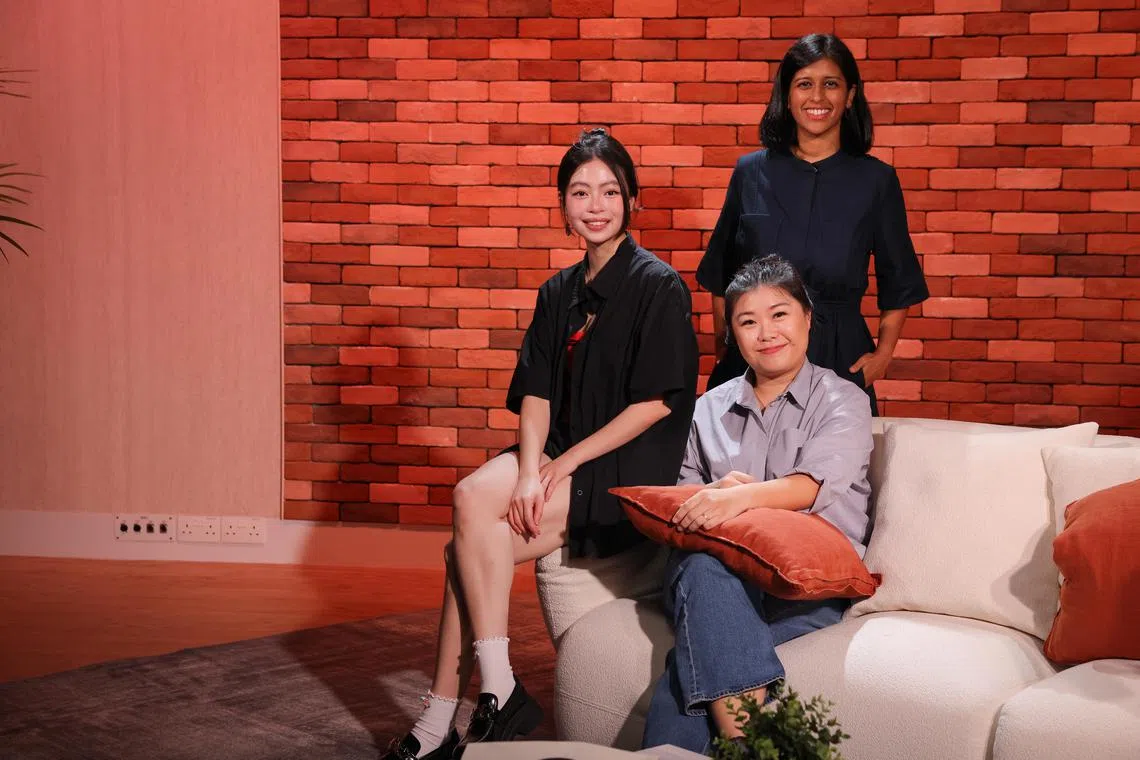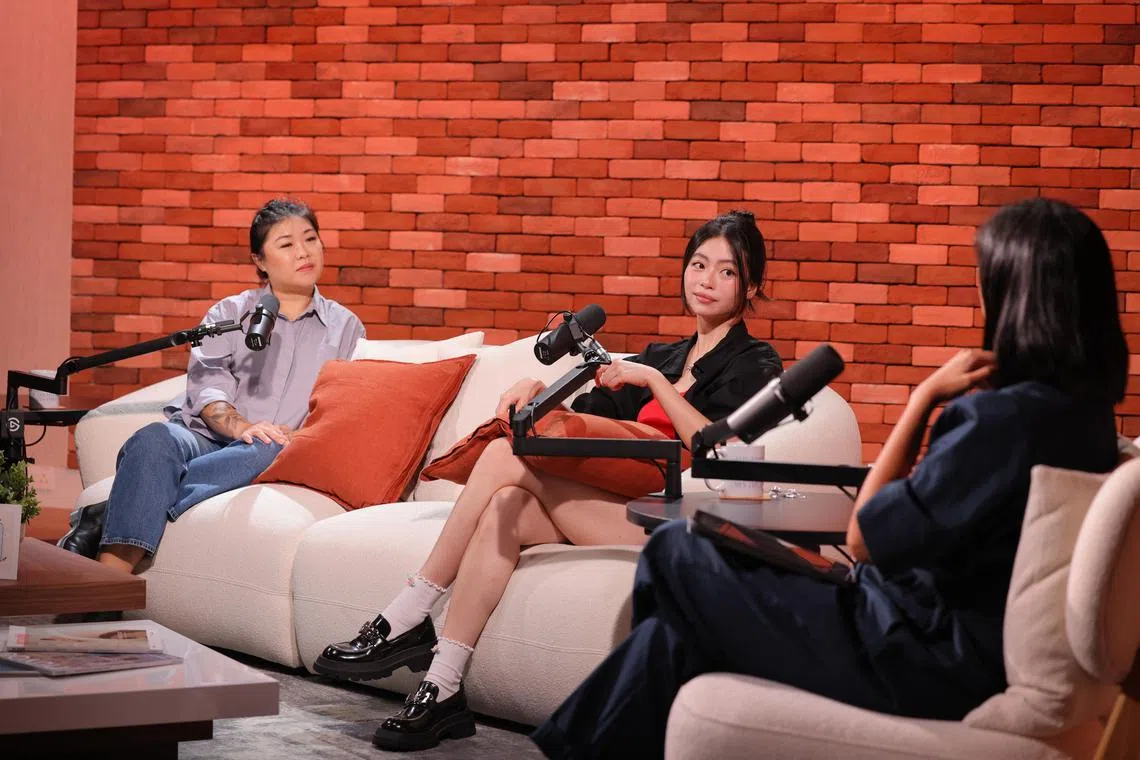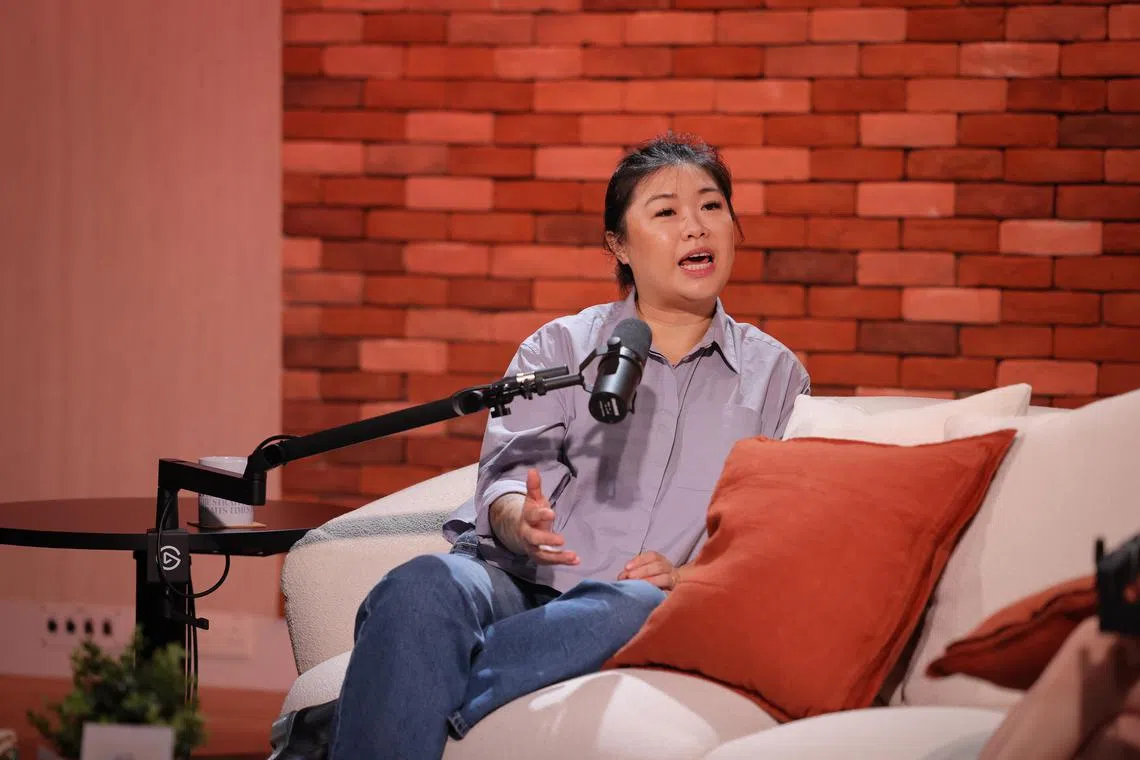The Usual Place Podcast
With all the talk about mental health, should we be in therapy?
Sign up now: Get ST's newsletters delivered to your inbox
With more people conscious about mental health issues, is going to therapy the solution to deal with inner mind and emotional struggles?
SINGAPORE - These days, conversations about mental health – and content about it – are everywhere.
Within that space, therapy often comes up as a way to deal with such issues.
People write about it in personal essays, it’s bandied around in memes, and on TikTok, there are therapists who create short-form videos about boundaries, trauma and coping mechanisms.
But should everyone be in therapy?

(Counter-clockwise) Singer-songwriter Layyi and Raquel Ang, co-founder of telewellness platform IHearU App, chats with The Usual Place’s host Natasha Ann Zachariah about their personal experiences with therapy.
ST PHOTO: ONG WEE JIN
In this latest episode of The Usual Place, I spoke with Raquel Ang, 35, co-founder of telewellness platform IHearU App, and singer-songwriter Layyi, 28, who is featured on a new song called Lovin’ Me.
The track, led by local singer-songwriter Haneri and also features Whylucas, is part of a recently launched youth mental wellness initiative by McDonald’s Singapore.
Raquel, who has a Master’s in Counselling, has been in therapy for about two years, while Layyi (whose name is Esther Lo) started in September 2023.
In our conversation, we discussed whether therapy should be a universal experience or a personal choice.
We also unpacked how therapy has changed my two guests, their initial concerns about going for it and why it is one of many tools for mental health.
Both of them said they experienced a “breaking point” in their lives which pushed them to explore therapy.
Raquel went through divorce, and later, her parents’ marriage also fell apart.
“I reached a breaking point, where I felt I couldn’t bottle up these emotions any more,” she said.

Both women say that they reached a “breaking point” recently in their lives, which made them look to therapy to dissect their issues.
ST PHOTO: ONG WEE JIN
A friend who had gone through divorce encouraged Raquel to talk to someone.
It pushed her to think about therapy, but it would be a few months later – and about two years after her divorce – before she contacted a therapist.
Often, many people turn to their friends for advice on how to deal with life. So why do some people choose not to offload on their friends and see a therapist instead?
Layyi felt that because of her rough upbringing, she was forced to be more emotionally mature than her peers.
“I find that sometimes my peers cannot really relate to what I’m going through, and that’s why they don’t know what to say,” explained the singer.
“I might get the initial sense of comfort that I have someone to talk to, but after that I want to understand myself better and they cannot provide that understanding.”
She goes for therapy monthly, and finds that it is a space where she has made personal discoveries and tackled issues such as her imposter syndrome, where she never feels good enough.
“It’s very lonely,” said Layyi about dealing with her issue. Through therapy, she has uncovered clear behaviour patterns that affect the way she thinks about her life’s situations.
She added: “If I didn’t go for therapy, I wouldn’t have figured this out on my own.”

Layyi, whose name is Esther Lo, says that talking about her issues in therapy reveal her behavioural patterns in life.
ST PHOTO: ONG WEE JIN
Even though the conversation about mental health has become mainstream these days, I wanted to know if both my guests were worried about telling others that they are in therapy.
Layyi said she felt self-conscious when she turned up for her first session, and saw others in the waiting room of the counselling centre.
Meanwhile, Raquel had a panic attack before her first session. She was worried that the therapist was going to think she was crazy and send her to the Institute of Mental Health.
“The anxiety was really self-defeating. I was just falling apart even before going for therapy,” said Raquel.
After her first session, she said “it was life-changing”.
She said she came to understand that it was all right to feel the way she was feeling, and was grateful to have someone just sit and listen to her.
On the stigma of therapy, she said that there’s this perception that therapy is only for weak people, and often that could lead to critical self-judgement – which is what she did to herself.
“We’re taught not to air our dirty laundry, and I think in a lot of millennials, we believe that we need to be perfect...so we cannot go for therapy.”
When should someone consider therapy as an avenue for their mental health?
Layyi’s take is that it would be useful for people to go for therapy to pick up behavioural patterns to get a deeper understanding of themselves.
“Going for therapy is like going on a date with yourself. It’s like when you’re learning to love (someone), they have to communicate to you about what they like and what they don’t like.
“I think going for therapy is the same. You’ll ask yourself ‘how do you want to be loved?’ or ‘How are you feeling in this situation?’”
Raquel agreed, adding that therapy can be like looking into a mirror.

Raquel says that going for therapy is like looking into a mirror, while Layyi likens it to going on a date with yourself.
ST PHOTO: ONG WEE JIN
To go or not to, she said, depends on what’s going on in a person’s life, and “an openness and eagerness for change”.
She said: “It’s not a one-size-fits-all (solution).”
What’s your take on going for therapy? Tell me on IG, on e-mail, or in the comment section of this video on YouTube.
I’ll see you next time at The Usual Place, Nat
Giveaway Alert
The Usual Place Podcast will give away 10 sets of exclusive McDonald’s merchandise to be given away. Each set consists of a tote bag, a sticker sheet, four postcards and a pack of F&B vouchers (expiring on Dec 31, 2024).
Here’s how you can win them: Subscribe to The Straits Times Podcasts’ YouTube channel
The Usual Place team will select 10 winners and get in touch with them.
Host: Natasha Zachariah ( natashaz@sph.com.sg
Follow Natasha on her IG account and DM her your thoughts on this topic: https://str.sg/8Wav
Follow Natasha on LinkedIn: https://str.sg/v6DN
Read Natasha’s articles: https://str.sg/iSXm
Filmed by: Studio+65
Edited by ST Podcast producers: Teo Tong Kai & Eden Soh
Executive producers: Ernest Luis & Lynda Hong
Follow The Usual Place Podcast here and get notified for new episode drops:
Channel: https://str.sg/5nfm
Apple Podcasts: https://str.sg/9ijX
Spotify: https://str.sg/cd2P
YouTube: https://str.sg/wEr7u
Feedback to: podcast@sph.com.sg
---
Follow more ST podcast channels:
All-in-one ST Podcasts channel: https://str.sg/wvz7
ST Podcast website: http://str.sg/stpodcasts
ST Podcasts YouTube: https://str.sg/4Vwsa
---
Get The Straits Times’ app, which has a dedicated podcast player section:
The App Store: https://str.sg/icyB
Google Play: https://str.sg/icyX



